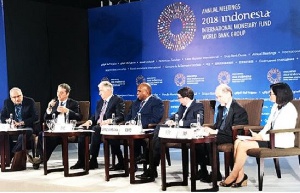The global trade regulator World Trade Organisation (WTO) has joined six other international organisations – including the International Finance Corporation (IFC) and Africa Export-Import Bank – to work collectively on closing the gaps in global trade finance.
The four other organisations are the International Islamic Trade Finance Corporation (a member of the Islamic Development Bank Group); the International Monetary Fund (IMF); the European Bank for Reconstruction and Development; and the Financial Stability Board (FSB).
The decision was taken at a special session during the annual meetings of the World Bank and International Monetary Fund (IMF) which took place earlier this week in Nusa Dua, Bali-Indonesia, and is seen as a giant step toward enhancing financial inclusion in trade.
Director-General of the WTO, Roberto Azevêdo, in his remarks on the partnership indicated that such an action is needed to address the lost opportunities for growth and development in relation to global trade.
He said: “We need to make global trade more inclusive. But trade inclusion needs financial inclusion. So, we need to continue developing concrete ideas and solutions that make a real difference. Working with a range of partners – including the private sector – can help provide momentum to this work”.
He added: “Despite the importance of trade finance, a number of problems have emerged since the financial crisis; supply and demand have become unbalanced.
Perceived regulatory risk, combined with low capacity of the financial sector in some countries, has resulted in big gaps in provision.”
The Asian Development Bank estimates that the global gap in trade finance is about US$1.5 trillion, representing a significant barrier to trade, while about 60 percent of trade finance requests by small and medium enterprises are rejected.
The World Economic Forum also projects that this gap could widen further still, reaching 2.5 trillion dollars by 2025 as supply chains move away from China to poorer developing countries.
It is also of particular concern that this gap affects developing countries and smaller businesses the most.
According to the WTO boss, about 80 percent of global trade transactions require some sort of financial credit or a guarantee – which means that to finance 18 trillion dollars in annual flows of trade, there needs to be a well-functioning trade finance market of about 14 trillion dollars.
He however indicated that some significant strides have been made in recent years toward improving global trade finance, including enhancing the trade finance programmes of key institutions.
Such programmes, he said, are expected to support over US$35 billion of trade this year; which is an increase of more than 50% over two years.
Business News of Saturday, 13 October 2018
Source: thebftonline.com













